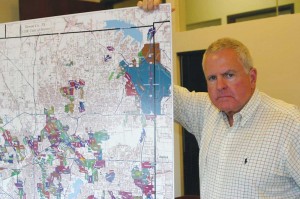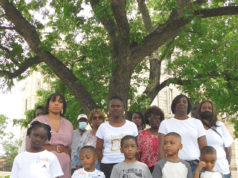The city of Fort Worth has earned $225 million in royalties since gas drilling began on city land a decade ago, based on a revenue summary report provided by city officials. Shale money has paid for improvements at parks, airports, and a golf course. Royalties have paid for structural repairs at Log Cabin Village, plumbing repairs at the Botanic Garden, dredging at Lake Worth, land purchases at the Fort Worth Nature Center and Refuge, and improvements to many other popular sites and facilities.
Gas drillers warned that royalties tend to shoot high in the early stages of drilling and taper off over time. If the $1 billion overall prediction were holding accurate, the city should have more than $500 million by now.
Former Fort Worth Mayor Ken Barr was in office when gas drillers first started knocking on the city’s door with plans for drilling inside the city limits in the early 2000s. Barr left office in 2003 and made way for Moncrief to run for mayor. The powerful Moncrief, a former state senator who earned his vast wealth from oil and gas, knew the drillers. He also knew how to properly put lipstick on a pig when pitching to an unsuspecting populace mostly unfamiliar with the problems of living near industrial sites.

In 2006 the city council created an urban drilling task force composed mostly of drilling executives. The task force showed little interest in listening to drilling opponents. The Fort Worth City Council approved an industry-friendly ordinance that year. Wells could be drilled within 600 feet of homes and schools, or even 300 feet with a variance.
Charles Boswell was the city manager trying to come up with policies on gas drilling in 2001. City staff had to develop an ordinance and figure out what to do with the royalty and tax revenue the shale play would generate. No one on staff had any experience in writing policy for urban gas drilling, and debates about what to do with the money went on for months. There were those who wanted to spend it all at once on basic stuff such as street improvements and those, like Boswell, who preached a more measured approach.
Boswell didn’t want the city to become overly dependent on a source of money that could fluctuate and wasn’t sustainable. The city chose to keep its royalty money apart from its regular budget.
“We’d use it for capital improvements, for one-time improvements as opposed to hiring someone or [starting] things that have an ongoing cost,” he said. “It isn’t the type of thing you can base your everyday operating budget on, so we wanted to be very cautious in developing policy.”
He faced the obstacle of various state, federal, and local restrictions on how certain pools of money could be spent. For example, federal law says revenue generated from airport property must be spent only on airport improvements. State and city charters say revenue from parkland must be spent on parks. Royalties earned from drilling under a lake must go back into lake improvements, and so on.
Boswell, who stepped down in 2008, said gas royalties enabled the city to pay for some capital projects that might otherwise have required bond issues. But the $225 million collected thus far, spread out over a decade, isn’t a staggering amount, considering the city’s annual budget is about $1.5 billion.
“It’s not something that enabled us to cut the tax rate,” he said. “It was helpful, but only to a limited extent.”
In 2011 the Fort Worth Chamber of Commerce commissioned a study on gas drilling’s impact on the region’s business activity. The study said drilling added $11 billion to the local economy that year and more than 100,000 jobs. From 2001 to 2011, the report concluded, Barnett Shale drilling accounted for $65 billion in economic output and more than half a million jobs, with almost 40 percent of our economy’s growth tied to shale production. Counties, cities, and school districts received more than $730 million in tax revenue from the Barnett Shale in 2011 alone, according to the report.
The study was conducted by The Perryman Group, a Waco-based economic research firm. To arrive at their numbers, the group factored in hundreds of variables, including surveys of other towns, local investment, industry information, job growth, and money pumped into the economy by everything from increased hotel occupancy taxes to money spent on cab rides and restaurant meals.
Critics say the study lacks credibility since it doesn’t reveal the formulas used to derive those numbers, nor does it take into account the people who have lost homes, health, livestock, and the use of their land to drillers, pipelines, and increased air- and water-pollution problems.
********












I’m glad other people in Tarrant County see what is going on, Cheespeake is stealing us blind, I have upwards of 3 acres in within Fort Worth, and as of now we have seen very little maybe 20.00 per1/4acre a month ! Fracking Crooks!!!!!!!!, there is no doubt to anyone with half a brain. I call B**LS**T, on their crimes! They need to be bankrupted for sure!!!!! I’M DONE!!!
🙂 wake up everyone. You can voice your opinion, but if you sleep through sleezy politics, then you are dreaming if you think your opinion matters. Your opinion only matters at your local council meetings. Make your frustrations heard. Do something
gas makes me hard.
All Repukes are hard-headed George, tell us something we don’t know. What do you eat?